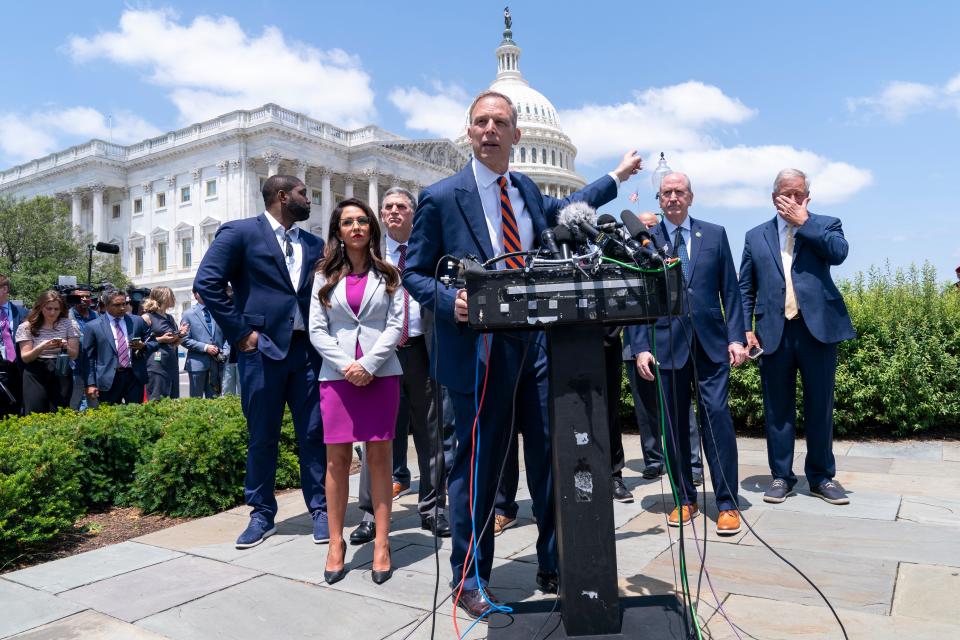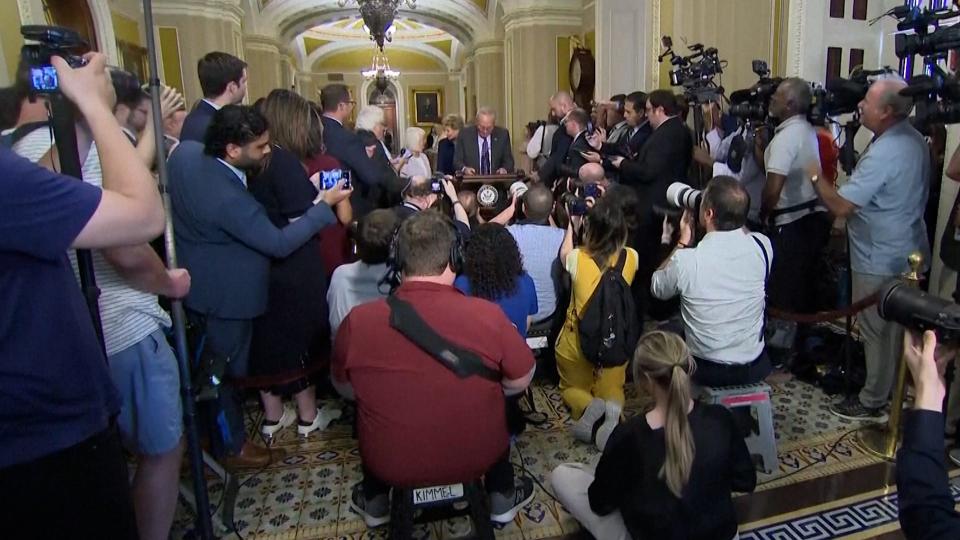Is a government shutdown imminent? What Congress needs to do (quickly) to avoid one.
- Oops!Something went wrong.Please try again later.
WASHINGTON – The countdown is on for Congress to pass 12 spending bills to avert a total government shutdown where all but essential federal agencies would stop their work.
The odds of lawmakers meeting their deadline to pass the 12 spending bills aren't great. The House passed just one before their August recess. There are less than 10 working days before the Sept. 30 deadline when funding expires if lawmakers don't approve a dozen bills in both chambers.
House Speaker Kevin McCarthy, R-Calif., faces an added challenge alongside the time crunch, with opposition from a fractured Republican caucus where ultraconservative House Freedom Caucus members are insisting on hardline demands from spending negotiations.
McCarthy has some options, mostly centered around passing a stopgap measure called a continuing resolution. That acts to kick the can down the road and buy lawmakers more time before federal agencies that rely on annual appropriations stop nonessential functions.
Here's how a possible government shutdown in Congress could unfold:

Can Congress still avert a total shutdown?
The House has passed one spending bill, while the Senate is set to vote on a package of three.
But both chambers still need to agree on some contentious measures so the government can keep its doors open.
Sarah Binder, a political science professor at George Washington University, said it's unlikely Congress will pass the remaining spending bills before the shutdown date.
"There's no way for them to complete and have signed into law the 12 spending bills that would keep the entire government open absent any other action," she said.
This isn't rare in Congress. The last time the House and Senate passed all 12 spending bills that the president signed into law before funding expired was in 1997 − nearly 30 years ago.
There is a possibility that Congress could pass an individual spending bill in the next 10 days to avert a total shutdown and provide funding for certain federal agencies to continue operating at normal capacity.
But Binder is weary that there's enough time on the legislative calendar to pass any individual bills through both chambers.
"This time around, they're really running out of time to pass any of those," she said.
What is a continuing resolution?
Binder said the most realistic scenario is for Congress to pass a continuing resolution, or a stopgap measure, that extends last year's spending levels for a designated period of time.
"That's really where most of the attention is focused now," she said.
Questions remain as to what the stopgap would look like, whether McCarthy would be willing to bring one to the floor and if the Republican leader is able to garner enough votes for it to pass in the House.
Florida Republican Rep. Matt Gaetz on Tuesday threatened to oust McCarthy from his position as speaker if he brings a vote on a continuing resolution. Other members from the ultraconservative House Freedom Caucus have threatened to leverage a shutdown if a continuing resolution does not include more spending cuts or other provisions, like more security for the southern border.
"Most likely if Congress can do a stopgap, they're really talking about continuing this year's levels, although those levels are really too high for many of the House Republicans," Binder said.
Previous stopgap measures have extended funding to around December, but McCarthy has hinted at a shorter, one-month extension, CNN reported.
"But that debate itself (over the length of a continuing resolution) is masking bigger problems that have to be solved," she said.
If the House passes the stopgap measure, Binder said it will likely pass quickly in the Senate by unanimous consent in order to avoid an immediate government shutdown.

What happens if Congress can't pass a continuing resolution?
If Congress can't pass a continuing resolution or pass any one spending bill, it would lead to a total government shutdown.
"Absent any last-minute action, this will be a total government shutdown because they haven't been able to pass any of the spending bills yet into law," Binder said.

What happens if there is a government shutdown?
If there is a shutdown, Americans would still receive mail, and Social Security recipients would still receive their checks. But several other government functions could be impacted:
◾ Federal employees would be furloughed.
◾ Government food assistance benefits could see delays.
◾ National parks may have to turn away visitors.
◾ Food safety inspections could be delayed.
◾ Air travel could be delayed.
Dig deeper: 'I've got a job to do': Biden dismisses GOP impeachment efforts in his public comments on the matter
This article originally appeared on USA TODAY: Are we going to have a government shutdown? How Congress could act

